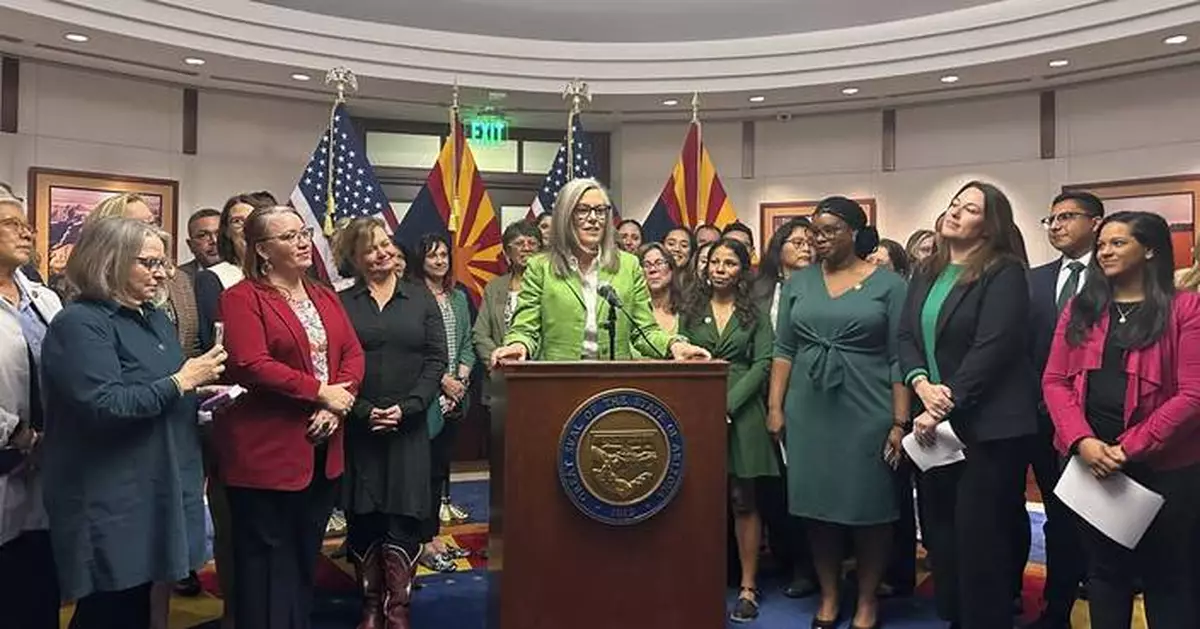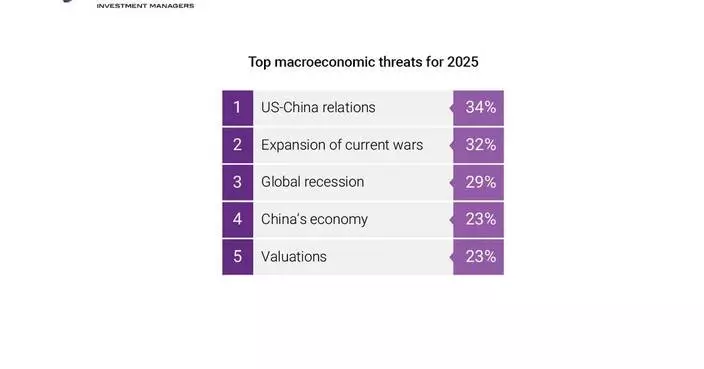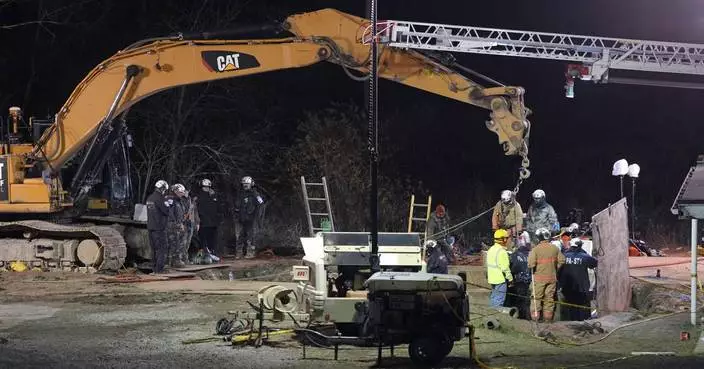PHOENIX (AP) — Reproductive rights advocates sued Arizona on Tuesday to undo a 15-week abortion ban that conflicts with a constitutional amendment recently approved by voters to expand access up to fetal viability.
The American Civil Liberties Union, Planned Parenthood and the Center for Reproductive Rights filed the lawsuit in Maricopa County Superior Court on behalf of the local chapter of Planned Parenthood and two physicians, arguing the law interferes with pregnant Arizonans’ fundamental right to abortion and individual autonomy. It’s the first step in efforts to dismantle existing laws they say are too restrictive.
The Republican-controlled Arizona Legislature approved the 15-week ban months before the U.S. Supreme Court overturned Roe v. Wade in 2022, but it didn't go into effect until after. Democratic Attorney General Kris Mayes agreed not to enforce the 15-week ban while the lawsuit plays out, spokesperson Richie Taylor said Tuesday.
Democratic Arizona Gov. Katie Hobbs said in a statement Tuesday that the ban should be removed from the books.
“Arizonans made it clear that they support reproductive freedom, and there is no question that a ban with no exceptions for rape or incest should be removed from our laws," she said, adding that she is "glad Arizonans are working to finish the job and enforce the constitutional protections we now enjoy.”
The lawsuit also seeks to undo the ban’s enforcement mechanisms, which could lead to criminal charges against providers who knowingly or intentionally perform abortions beyond 15 weeks except in medical emergencies. Physicians who violate the ban could face suspension or revocation of their medical licenses.
“The amendment itself does not sort of wipe the statute books clean, you know. Further action is needed in order to take that additional step to effectuate the amendment’s promise,” ACLU staff attorney Rebecca Chan said. “And so that’s really what this 15-week ban challenge is.”
Arizona was one of five states where voters approved ballot measures in the 2024 general election to add the right to an abortion to their state constitutions. Nevada voters also approved an amendment to codify its existing abortion rights in the state constitution, but they’ll need to pass it again in 2026 for it to take effect. Another that bans discrimination on the basis of “pregnancy outcomes” prevailed in New York.
The Arizona ballot measure gained momentum after a state Supreme Court ruling in April found that the state could enforce a near-total abortion ban adopted in 1864. Some GOP lawmakers joined with Democrats to repeal the law before it could be enforced.
The measure expands access to fetal viability — the point at which a fetus can survive outside the uterus. Though there’s no defined time frame for viability, doctors say it’s sometime after 21 weeks. It allows abortions after viability if they are necessary to protect the physical or mental health of the mother, or to save her life.
Most abortions happen early in pregnancy. The U.S. Centers for Disease Control and Prevention found that 93% of them nationally in 2022 were in the first 13 weeks, though that data does not include California and some other states where advocates believe a higher proportion of abortions are performed later in pregnancy.
The Nov. 25 certification of the general election opened the door for legal challenges to laws that conflict with the ballot measure, including a law that requires patients to have an ultrasound at least 24 hours before an abortion, with the option to view the image and hear an explanation of what it shows.
Reproductive rights groups signaled then that they would sue over the 15-week abortion ban.
“Clearly Planned Parenthood and ACLU and their allies have little regard for the life of an unborn child and the development of an unborn child," said Cathi Herrod, president of the socially conservative Center for Arizona Policy. Herrod previosly said the group would seek to intervene where appropriate.
Most Republican-controlled states have banned or restricted access to abortion, and abortion rights groups have pushed back.
In Missouri, Planned Parenthood affiliates sued immediately after a ballot measure there passed seeking to have bans and other abortion-restricting laws invalidated. The circumstances are different there because that state has a ban on abortion at all stages of pregnancy and no clinics are providing it. A hearing is scheduled for Wednesday.
Missouri’s Republican Attorney General Andrew Bailey wrote in an opinion that he will enforce some laws restricting abortion despite voter approval of a constitutional amendment widely expected to undo the state’s near-total ban on the procedure.
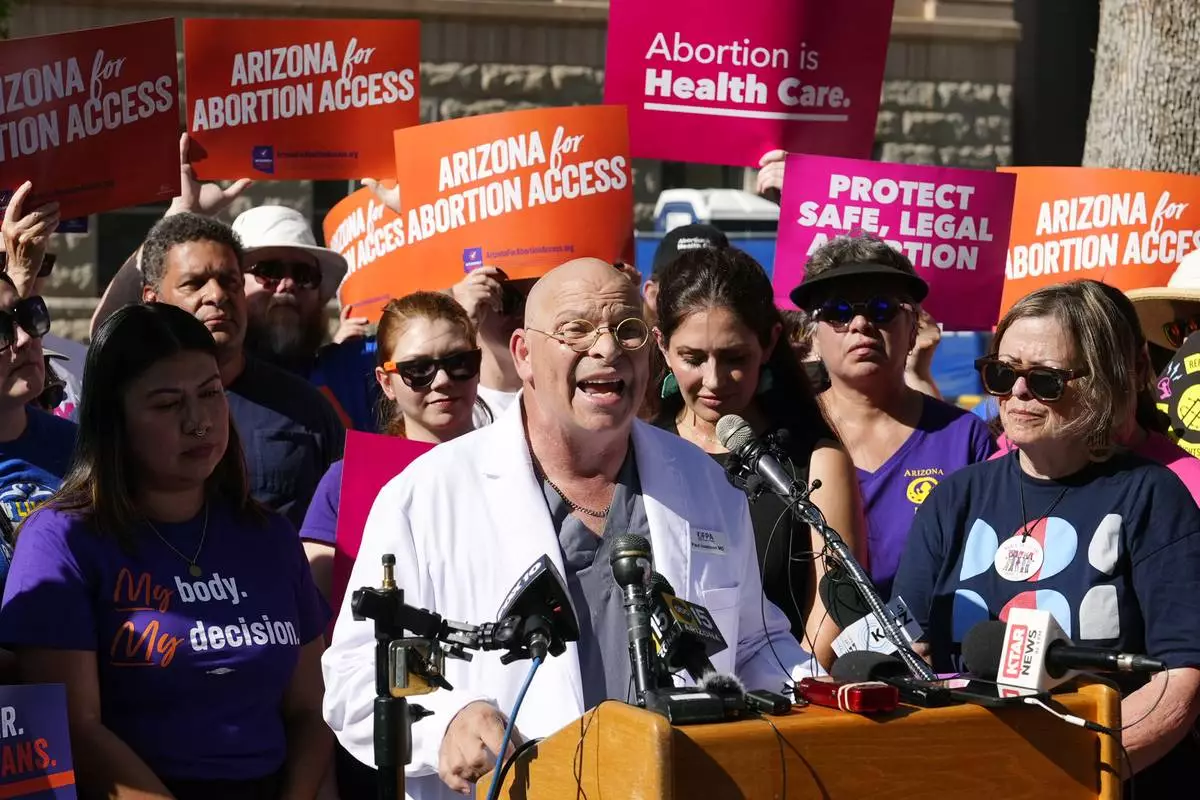
FILE - Dr. Paul Isaacson speaks as Arizona abortion-rights supporters gather for a news conference, July 3, 2024, in Phoenix. (AP Photo/Ross D. Franklin, file)
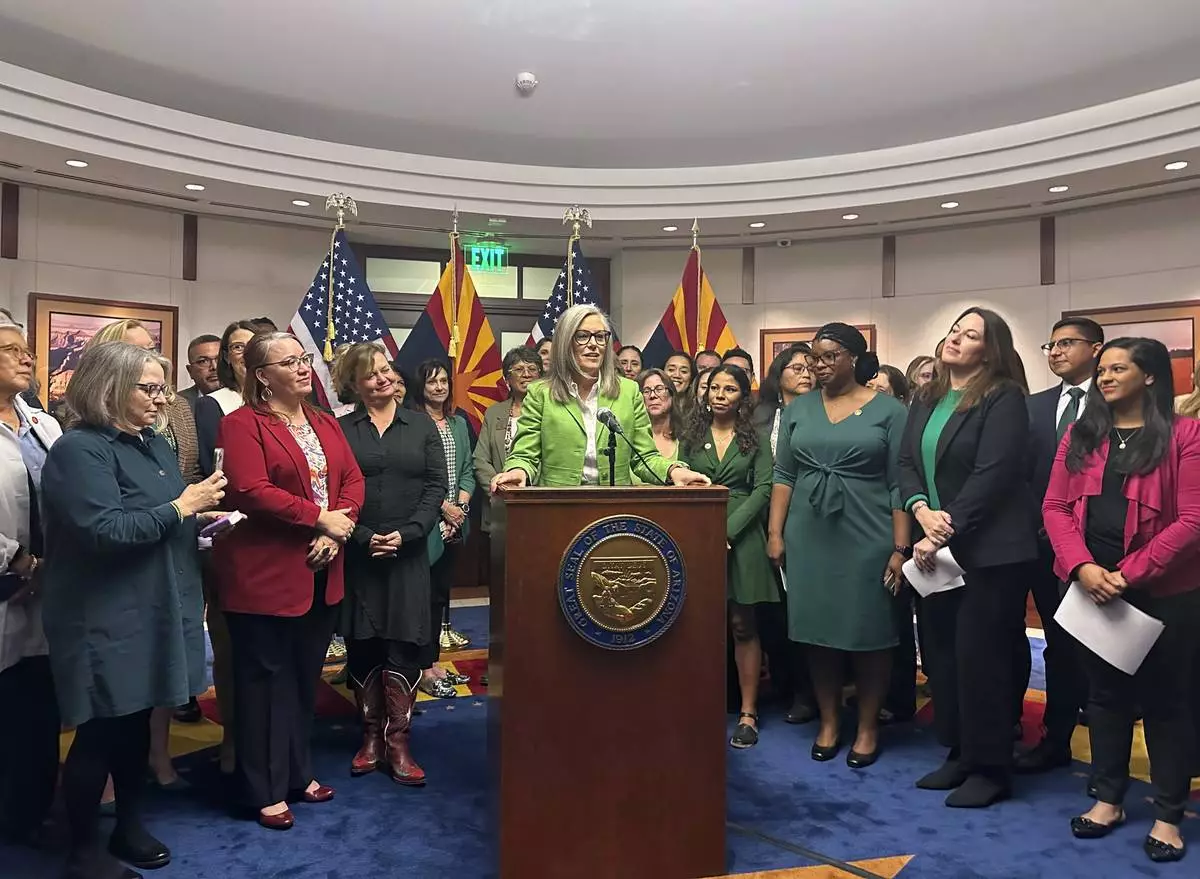
FILE - Arizona Gov. Katie Hobbs celebrates passages of abortion ballot measure surrounded by Democratic lawmakers and advocates on Nov. 25, 2024, at the State Capitol in Phoenix. (AP Photo/Sejal Govindarao, file)
The Supreme Court is set to hear arguments on Wednesday in just its second major transgender rights case, a challenge to a Tennessee law that bans gender-affirming care for minors.
The nation’s top court will be weighing whether Tennessee’s law violates the equal protection clause of the 14th Amendment, requiring that people in similar circumstances be treated the same under the law. Both sides in the case claim they are acting to protect minors from harm.
At least 26 states have adopted laws restricting or banning such care for minors, and most of those states face lawsuits.
Here's the latest:
Multiple bills related to transgender youth have already been filed in Texas’ legislature ahead of its session next year.
The proposals include a bill that would make it easier to sue providers of gender-affirming medical care for children.
Other bills include restrictions on which public restrooms transgender people can use, and limits on how topics related to sexual orientation and gender identity are taught in schools.
At least 26 states have adopted laws banning gender-affirming medical care for transgender minors. Federal judges in Arkansas and Florida have struck down the bans in those states as unconstitutional, though an appeals court has put the Florida ruling on hold. The ban in New Hampshire is to take effect on Jan. 1.
Several Democratic-controlled states have policies seeking to protect access to gender-affirming care.
Additionally, at least 24 states have bans barring transgender women and girls from competing in certain women’s and girls’ sports competitions. And at least 11 have laws barring transgender women and girls from using girls’ and women’s bathrooms at public schools — and in some cases, in other government facilities.
Most laws are reviewed and upheld under the lowest level of scrutiny, known as rational basis review. Indeed, the federal appeals court in Cincinnati that allowed the Tennessee law to be enforced held that lawmakers acted rationally in adopting the law to address the risks they perceived in gender-affirming care for minors.
But when discrimination is present, judges take a closer look.
Sex discrimination gets heightened scrutiny, which requires states to identify an important objective and show that the law helps accomplish it. Racial discrimination, not at issue here, is reviewed under strict scrutiny — the highest level — and laws rarely survive such a demanding examination.
Roberts and Gorsuch joined the court’s liberal justices in the 2020 workplace discrimination case won by LGBTQ+ plaintiffs. Three conservative justices, Samuel Alito, Brett Kavanaugh and Clarence Thomas, dissented.
If the parties challenging the Tennessee law hope to win, they need at least two conservative justices on their side, along with the three liberal members of the court. Barrett has no track record on transgender issues, although she votes with the other conservatives in most of the high-profile cases.
The Supreme Court almost always issues its decisions by early summer, usually before the end of June. The transgender health case could be one of the last cases decided, which is typical of highly contentious issues. One additional potential cause for delay is the Trump administration could weigh in soon after he takes office. It’s not clear how that might affect the case.
Chase Strangio will be the first openly transgender attorney to argue before the nation’s highest court, representing families who say Tennessee’s ban on health care for transgender minors leaves their children terrified about the future.
Strangio will bring months of intense legal preparation to the case as well as hard-won lessons from his own experience.
“I am able to do my job because I have had this health care that transformed and, frankly, saved my life,” he said. “I am a testament to the fact that we live among everyone.”
Strangio grew up outside of Boston and came out as trans when he was in law school. Now 42, he’s an American Civil Liberties Union attorney whose legal career has included representing former Army intelligence analyst Chelsea Manning, challenging a ban on transgender people serving in the military and helping win an LGBTQ+ worker-discrimination case at the Supreme Court. He’s also the father of a 12-year-old, the son of a father who supports Trump, and has a close relationship with his Army veteran brother.
▶ Read more about Strangio and his history as a transgender advocate
The Supreme Court’s only other major case on transgender rights was in 2020 when the court ruled that workplace discrimination against LGBTQ+ people was sex discrimination in violation of the federal civil rights law commonly known as Title VII.
The court concluded in separate cases involving a gay man and a transgender woman that they were discriminated against because of their sex. Justice Neil Gorsuch, an appointee of Donald Trump’s in his first term in the White House, wrote the 6-3 opinion for the court. Chief Justice John Roberts was the only other conservative member of the court in the majority.
The nation’s top court will be weighing whether Tennessee’s law violates the equal protection clause of the 14th Amendment, requiring that people in similar circumstances be treated the same under the law. Both sides in the case claim they are acting to protect minors from harm.
Transgender attorney Chase Strangio will represent families who say Tennessee’s ban leaves them terrified for the future and that access to this kind of care is life-saving.
Tennessee, meanwhile, will argue before the Supreme Court that treatments like puberty blockers and hormones carry risks for young people and its law protects them from making treatment decisions prematurely.
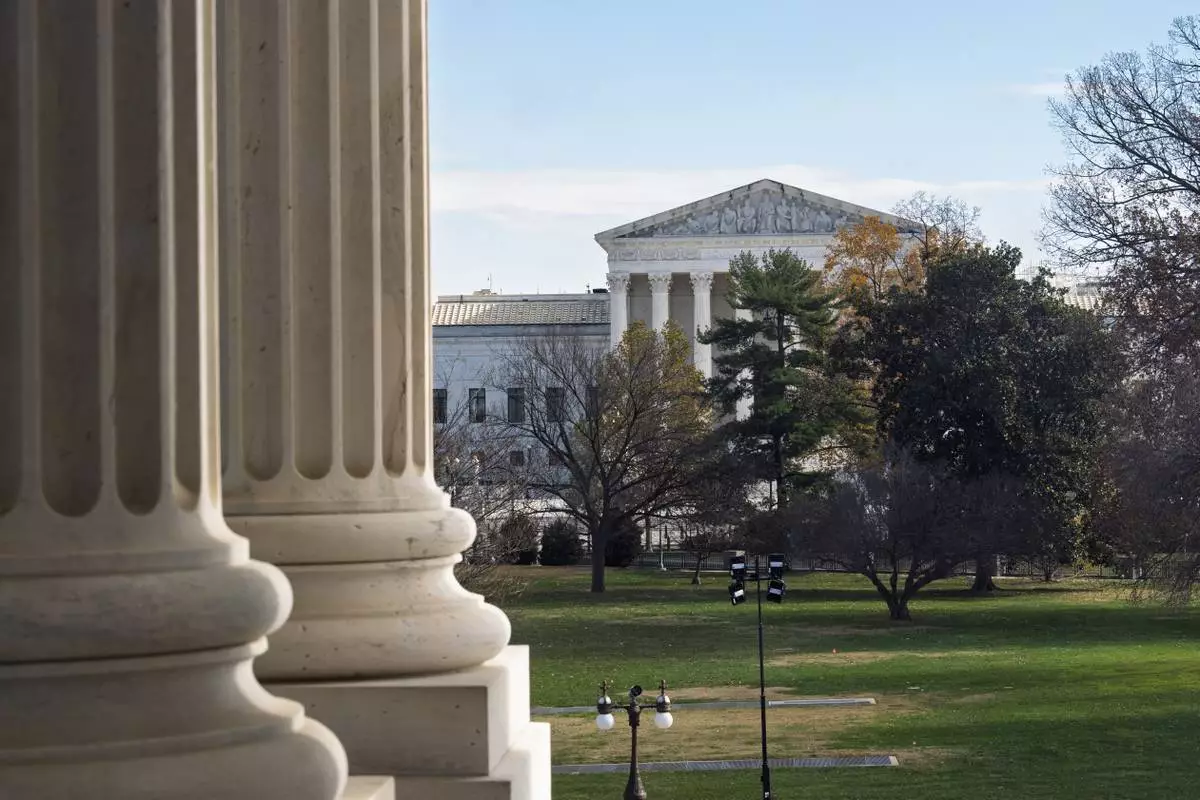
The Supreme Court is framed by the columns of the Capitol in Washington, Tuesday, Dec. 3, 2024. T (AP Photo/J. Scott Applewhite)

FILE - Advocates gather for a rally at the state Capitol complex in Nashville, Tenn., to oppose a series of bills that target the LGBTQ community, Feb. 14, 2023. (AP Photo/Jonathan Mattise, File)
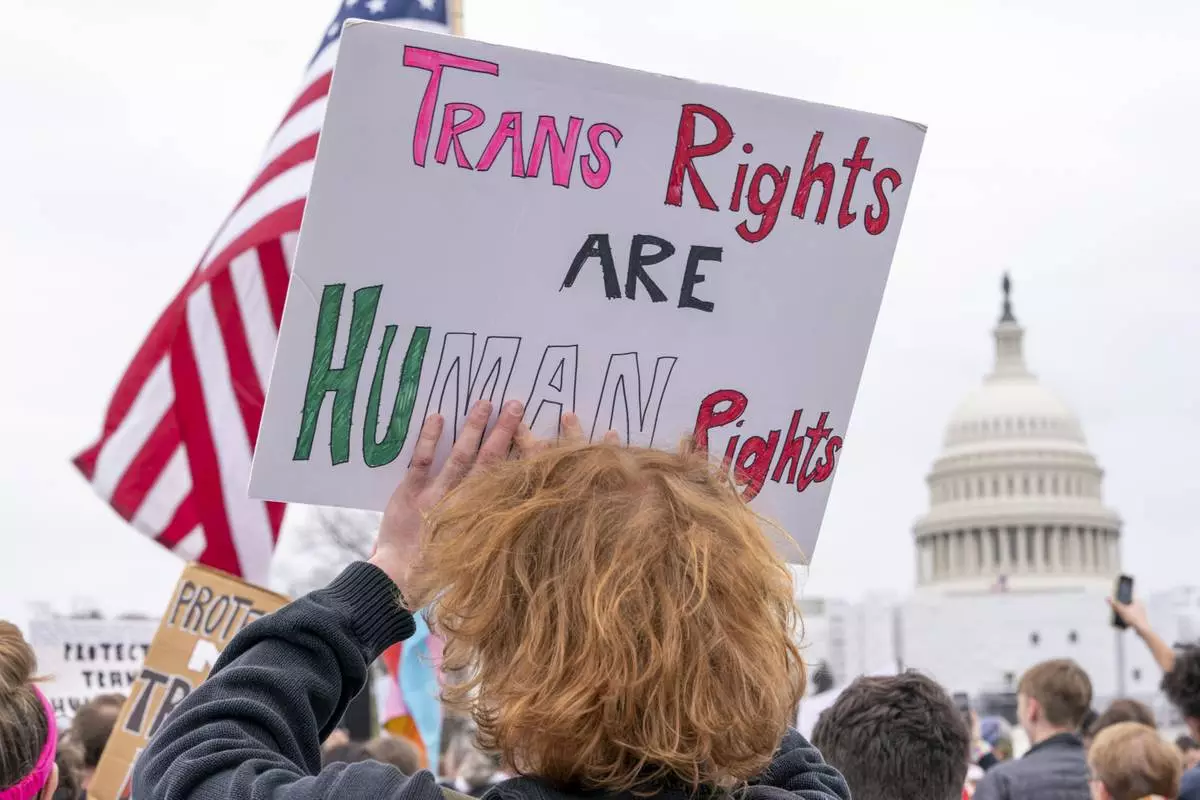
FILE - People attend a rally as part of a Transgender Day of Visibility, Friday, March 31, 2023, by the Capitol in Washington. (AP Photo/Jacquelyn Martin, File)
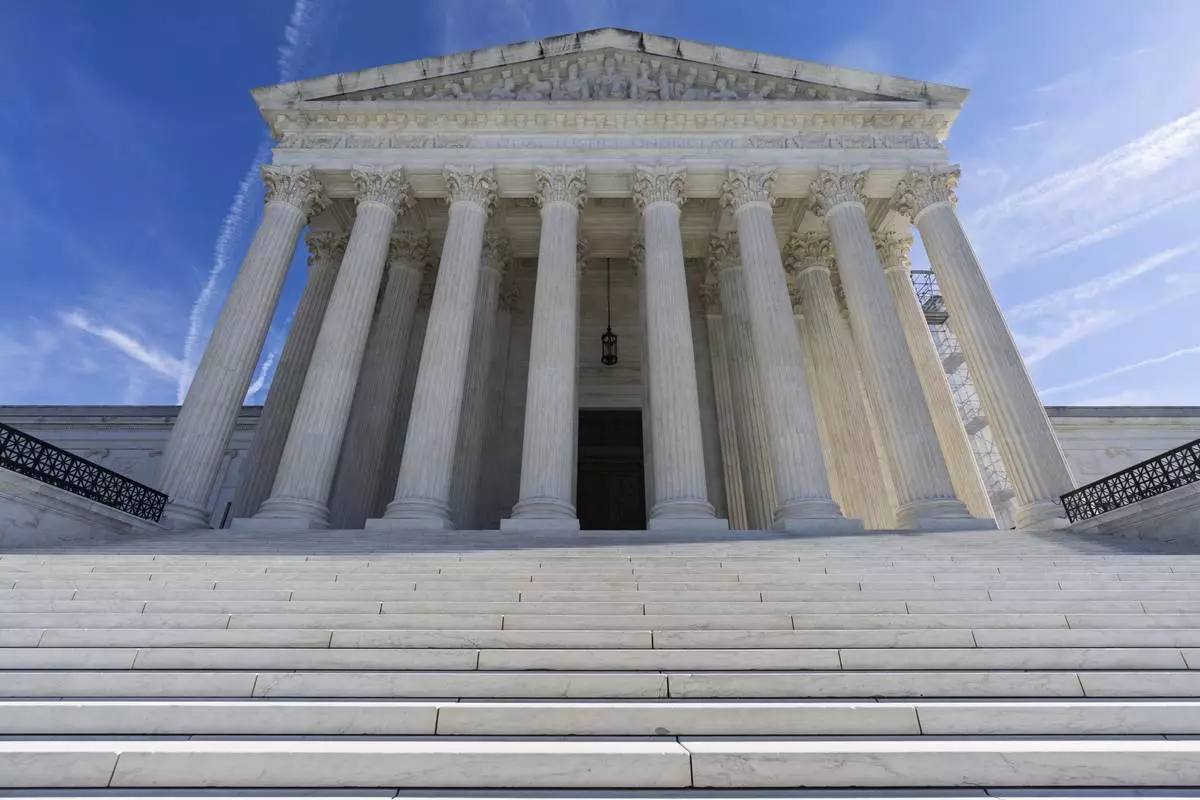
FILE - The Supreme Court is seen in Washington, Nov. 2, 2024. (AP Photo/J. Scott Applewhite, File)




